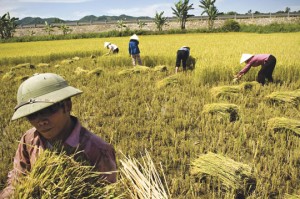US News and World Report | 12 June 2008
As food crisis worsens, some nations are desperate for arable land
By Kent Garber
The Persian Gulf may be flush with money from oil, but it is desperate for food. Many of the richest countries in the region, including Saudi Arabia, are handicapped by a dry, unforgiving climate and a shortage of farmland; thus they must import more than 60 percent of their annual food supply. Existing water stores are expected to be exhausted in 30 years, and yet, food demand is growing. Population growth in the region is more than double the world average, the prices of some staples are up more than 30 percent this year, and civil unrest is mounting.
It is, in short, a daunting situation, and conventional responses appear inadequate. Continuing to rely on food from other countries, many government leaders believe, is not only risky but shortsighted in an era of tight trade restrictions and projections of even higher prices. And so officials have begun laying the groundwork for a new approach: buying or renting farmland in other countries—sometimes thousands of miles away.
In recent weeks, officials and businessmen from Saudi Arabia have met with representatives of Thailand and South Africa to talk about buying farmland. The United Arab Emirates has looked at arable land in Sudan, Egypt, and Yemen and is pursuing a $3 billion deal in Pakistan with several private companies to build large corporate farms for growing rice, wheat, sugar cane, and fruits. Abu Dhabi has reportedly signed a deal with Sudan to develop 70,000 acres there.
Looking to Asia. The Persian Gulf states have been the most aggressive in these pursuits, but they are not alone. In April, the president of South Korea, Lee Myung-Bak, expressed interest in renting farmland in eastern Russia or Southeast Asia. Chinese firms, many with close government ties, have recently pursued deals in the Philippines and Africa and are rumored to be eyeing land in Australia.
Even individual farmers from the United States and Australia have started looking in larger numbers to overseas farmland, particularly in South America. "We have certainly seen an increase [here]," says Andy Duff, a Rabobank International analyst based in Brazil. "There are the investors who see land as the root of all commodities and believe land may be an interesting investment, and we have also seen bona fide farmers who are looking to expand their operations from other parts of the world."
Globally, farmland is disappearing at an alarming rate. According to estimates, approximately 50 million acres vanish each year to urbanization, population growth, and economic and industrial development. In Iraq, where the Tigris and Euphrates rivers have nourished riverbanks since the start of civilization, farmland is expected to shrink 30 percent because of upriver damming in Turkey. Vietnam lost 1.2 million acres of farmland from 2001 to 2007; 123 golf courses, among other developments, have gone up since.
A few developing countries have tried to slow or halt the turnover. China, after seeing its farmland dwindle by tens of millions of acres in the first part of the decade, has imposed tight restrictions on land conversions and, in January, began prosecuting thousands of alleged offenders. But, says Chietigj Bajpaee, an analyst for Global Insight, a forecasting company, "trying to stop the conversion of land is the exception rather than the rule."
From a historical perspective, land grabs are nothing new. Imperialism and colonialism were defined to a large extent by efforts to acquire power through land. These campaigns, how-ever, were characterized not by diplomacy or money but by violence and force. What's happening now is different, although it raises old questions about sovereignty and workers' rights.
Though the terms of the deals vary—some involve land purchases, others, large investments in existing farms—most will result in the employment of local workers and require negotiations about where the food goes after harvest. In Sudan, for instance, where food riots broke out last month, officials don't want to create the impression of helping others and not their own.
Some observers see the potential for large and enduring benefits on both sides. The reported sellers of under-developed farmland, Pakistan and Sudan, for example, are poor and lack the resources to make their own land productive. Foreign investment is meant to help the investor, but in these cases it might also help the host countries by improving roads and irrigation and, of course, providing cash. The question is ultimately one of balance: wooing the big spenders without ceding too much land or control at home.














